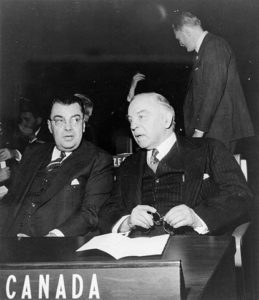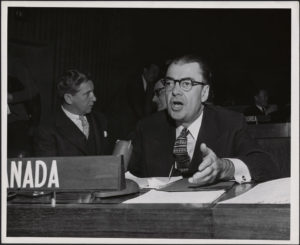When Paul Martin Sr. rose in the House of Commons on February 24, 1937 to encourage the federal government to provide scholarships to outstanding students who could not afford to attend post-secondary education, he was reflecting on his own experiences growing up in a low income family in Pembroke.
The future Liberal cabinet minister had attended several higher education institutes including some of the most prestigious schools in the world, but none of those experiences would have happened without the generosity of others.
 Martin’s original plans were to become a Priest and he received help through the Pembroke Diocese of the Catholic Church to pay tuition at a school in Gatineau, Quebec. While studying in Gatineau, he remained enthralled with the happenings at near-by Parliament Hill, where he climbed a tree to watch the funeral procession for one of his early political heroes, Sir Wilfrid Laurier. He had left home at only 15 years of age and by his late teenage years, he knew politics was where he wanted to be.
Martin’s original plans were to become a Priest and he received help through the Pembroke Diocese of the Catholic Church to pay tuition at a school in Gatineau, Quebec. While studying in Gatineau, he remained enthralled with the happenings at near-by Parliament Hill, where he climbed a tree to watch the funeral procession for one of his early political heroes, Sir Wilfrid Laurier. He had left home at only 15 years of age and by his late teenage years, he knew politics was where he wanted to be.
As a stepping stone to public life, Martin pursued a law degree by first studying at St. Michael’s College on his road to Osgoode Hall in Toronto. His interest in international matters led him to Harvard University in Boston and then Trinity College in Cambridge, England. When he returned to Canada, his quest to enter politics continued as he became involved with the Liberal party, making valuable connections across the country.
After an unsuccessful provincial election bid in his hometown, Martin settled in Windsor where he went on to win ten consecutive elections leading to a 33-year career in the House of Commons.
 Best known for his work as Minister of Health and Wellness, Martin is widely credited along with Tommy Douglas as the fathers of universal health care in Canada. He also initiated the introduction of mandatory polio vaccinations for children, a move that saved thousands of lives. Martin and his son, the future Prime Minister, both suffered from polio as children, and he was determined to eradicate the disease.
Best known for his work as Minister of Health and Wellness, Martin is widely credited along with Tommy Douglas as the fathers of universal health care in Canada. He also initiated the introduction of mandatory polio vaccinations for children, a move that saved thousands of lives. Martin and his son, the future Prime Minister, both suffered from polio as children, and he was determined to eradicate the disease.
Martin’s first cabinet post came ten years after he was elected when he became Canada’s Secretary of State. He was well respected at the United Nations and was a major influence to Canadian social policy following the second World War, advocating programs such as unemployment insurance, a minimum wage and the right of workers to unionize. After voluntarily leaving politics, he joined the senate as the government house leader and finished his political career as the High Commissioner to the United Kingdom.
Paul Martin Sr. was a great Canadian. He served under four Prime Ministers, and while he never had the opportunity to lead his country as its highest elected official, he arguably made some of the greatest contributions to our country though his work as a senior Liberal Cabinet minister.
On June 16, 2017, Algonquin College will pay tribute to his legacy through the posthumous awarding of an Honorary Degree to Paul Martin Senior. The Degree will be accepted by Canada’s 21st Prime Minister Paul Martin Jr., who is deeply touched by the college’s efforts. “This all the more so because of my Dad’s earliest initiative following his fist election in 1935 was to table a resolution in parliament, advocating more student aid which, as he said in his memoirs, reflected ‘my own experience as a boy whose parents could not afford to pay for his education.'”
All graduation ceremonies are special, but given the fact that Canada is celebrating its 150th birthday and the college is marking its 50th anniversary, listening to the address by the former Prime Minister will be a wonderful opportunity for all of the graduates and a life experience that will stick with them long after they leave Algonquin College.
The convocation ceremony will begin at 1 p.m. The ceremony is open to the public.
(Posted by Jamie Bramburger, Manager of Community and Student Affairs)